|
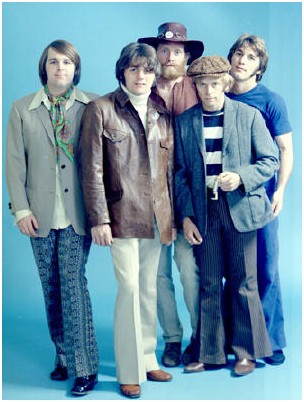 Beginning their career as the most popular surf band in the nation, the Beach Boys finally emerged by 1966 as America's preeminent pop group, the only act able to challenge (for a brief time) the over-arching success of the Beatles with both mainstream listeners and the critical community. The group's impeccable and amazingly tight harmony unquestionably made them the very best harmony band of the rock era. From their 1961 debut with the regional hit "Surfin," the three Wilson brothers -- Brian, Dennis, and Carl -- plus cousin Mike Love and friend Al Jardine constructed the most intricate, gorgeous harmonies ever heard from a pop band. With Brian's studio proficiency growing by leaps and bounds during the mid-'60s, the Beach Boys also proved to be one of the best-produced groups of the '60s, exemplified by their 1966 peak with the Pet Sounds LP and the number one single, "Good Vibrations." Though Brian's escalating drug use and obsessive desire to trump the Beatles (by recording the perfect LP statement) eventually led to a nervous breakdown after he heard Sgt. Pepper's Lonely Hearts Club Band, the group soldiered on long into the 1970s and '80s, with Brian only an inconsistent participant. The band's post-1966 material is often maligned (if it's recognized at all), but the truth is the Beach Boys continued to make great music well into the '70s. Displayed best on 1970's Sunflower, each member revealed individual talents never fully developed during the mid-'60s -- Carl became a solid, distinctive producer and Brian's replacement as nominal band-leader, Mike continued to provide a visual focus as the frontman for live shows, and Dennis developed his own notable songwriting talents. Though legal wranglings and marginal oldies tours during the '90s often obscured what made the Beach Boys great, the band's unerring ability to surf the waves of commercial success and artistic development during the '60s made them America's first, best rock band.
Beginning their career as the most popular surf band in the nation, the Beach Boys finally emerged by 1966 as America's preeminent pop group, the only act able to challenge (for a brief time) the over-arching success of the Beatles with both mainstream listeners and the critical community. The group's impeccable and amazingly tight harmony unquestionably made them the very best harmony band of the rock era. From their 1961 debut with the regional hit "Surfin," the three Wilson brothers -- Brian, Dennis, and Carl -- plus cousin Mike Love and friend Al Jardine constructed the most intricate, gorgeous harmonies ever heard from a pop band. With Brian's studio proficiency growing by leaps and bounds during the mid-'60s, the Beach Boys also proved to be one of the best-produced groups of the '60s, exemplified by their 1966 peak with the Pet Sounds LP and the number one single, "Good Vibrations." Though Brian's escalating drug use and obsessive desire to trump the Beatles (by recording the perfect LP statement) eventually led to a nervous breakdown after he heard Sgt. Pepper's Lonely Hearts Club Band, the group soldiered on long into the 1970s and '80s, with Brian only an inconsistent participant. The band's post-1966 material is often maligned (if it's recognized at all), but the truth is the Beach Boys continued to make great music well into the '70s. Displayed best on 1970's Sunflower, each member revealed individual talents never fully developed during the mid-'60s -- Carl became a solid, distinctive producer and Brian's replacement as nominal band-leader, Mike continued to provide a visual focus as the frontman for live shows, and Dennis developed his own notable songwriting talents. Though legal wranglings and marginal oldies tours during the '90s often obscured what made the Beach Boys great, the band's unerring ability to surf the waves of commercial success and artistic development during the '60s made them America's first, best rock band.
Their classic songs epitomize the spirit of the California lifestyle and The Beach Boys have become an American icon to a worldwide audience. The Beach Boys' first hit "Surfin'" (1961) launched a string
of chart-topping songs that spans nearly forty years and includes eternal anthems of American youth: "Surfin' USA," "Surfer Girl," "Fun, Fun, Fun," "I Get Around," "California Girls," "Help Me Rhonda," "Barbara Ann," "Good Vibrations," "Wouldn't It Be Nice," "Rock and Roll Music," "Kokomo" and more.
Their chart success alone would have earned The Beach Boys their spot in The Rock n' Roll Hall of Fame (they were inducted in 1988), not to mention 32 RIAA Platinum and Gold record awards and worldwide sales estimated at over 100 million. But The Beach Boys' story is one of not only commercial but also artistic success. Their unique blend of harmonies, musical arrangements and timeless lyrics still place the music of The Beach Boys among the All-Time Favorites of today's music critics. As an example, Rolling Stone magazine recently named Pet Sounds as the #2 best album of All-Time. The Beach Boys were honored at the 2001 Grammy® Awards, receiving The Lifetime Achievement Award from the Recording Academy.
In the 1960's, there were two groups on Capitol Records - one American, the other British - whose name began with the letters "B-E-A-." Each of these groups featured a bass playing songwriter born in June of 1942, and each group made records that have withstood the test of time to become classics of popular culture.
The Beatles, of course, broke up in 1970. But the American band, The Beach Boys, continued on, recording new material and selling out concert tours. To this day, generations of fans are still falling in love with the golden harmonies of California's musical ambassadors to the world.
For The Beach Boys, it all began in the modest home of Murry and Audree Wilson in the Los Angeles suburb of Hawthorne. In the bedroom shared by their sons, oldest brother Brian taught his younger siblings to sing. In late-night sessions, middle brother Dennis and baby brother Carl learned the harmonies that Brian had absorbed from countless listenings to Four Freshmen and Hi-Los records.
Joining in on Christmas carols at holiday gatherings was Mike Love, the Wilson brothers' first cousin. Mike and Brian also spent many nights together in the late '50's listening to the car radio and singing along to their favorite hits of the day.
However, until 1961, singing was just something the Wilson/Love clan did for fun. It was when that familial foursome became five in 1961, with the addition of Al Jardine (Brian's Hawthorne High football teammate and El Camino Junior College classmate) that the self-named "Pendletones" began to take their vocalizing a little more seriously. Al had a love of folk music and his voice was the fourth part to fill out the harmony blend.
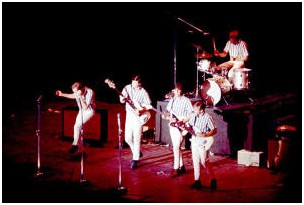
When Murry and Audree returned from a trip to Mexico, they found that Brian and Mike had penned "Surfin'," which would become The Beach Boys first single release on the Candix label. Thanks to a remarkable chain of events, they made their first recording and miraculously scored their first chart record.
The formula? Their California garage band sound and an original song about a local fad had immediate teen appeal, and "Surfin'" reached the Top 3 on L.A. radio hit-lists. But as each of the newly-named "Beach Boys" earned only about $200 from that moment of fame, in early '62 (even though the group had made their live performing debut on December 31, 1961 at a Ritchie Valens memorial concert), the record business probably felt more like a hobby than a job. After all, Carl and Dennis were still in high school, Al and Brian were in college and Mike was 20 and working a full-time job.
Nonetheless, they were determined to have a career, and they cut a demo tape that would turn out to be their first major label record. With that tape and the help of the Wilson brothers' father, Murry, the group secured a record contract with Capitol Records in mid-1962. Their first single, "Surfin' Safari" b/w "409" was virtually an overnight hit, and almost right out of the box, The Beach Boys became Capitol's hottest act.
In the late summer of '62, the group recorded their first long-player, Surfin' Safari, and that release triggered an avalanche of music. From 1962-1969, Capitol released 20 Beach Boys albums, many of which went "Gold" and hit the Top 20, as The Beach Boys became first the most popular group in American and ultimately one of the most popular in the world.
In another milestone, The Beach Boys pioneered the concept of the self-contained band, and in the process, revolutionized the recording business. In an unparalleled act of rock 'n' roll rebellion, The Beach Boys, with Murry Wilson running interference, turned the system upside down, demanding and winning the right to control their records. The Beach Boys' declaration of independence smashed all precedents. Brian Wilson won his creative freedom, and The Beach Boys became the first, and for a long time, the only rock artists to completely control the musical output of their career.
From the beginning, the group featured Carl Wilson (Brian's studio sidekick, the musical director of the touring band and a truly pacific soul) on lead guitar; Dennis (the inspiration for The Beach Boys' first song, the group's sex symbol and a real surfing beach boy) bashed on drums; Mike Love (Brian's first lyrical collaborator and the co-writer of many of The Beach Boys' biggest hits) sang lead and became the extroverted emcee of the live shows; Al Jardine (briefly replaced by Wilson neighbor David Marks in 1962 and 1963) strummed rhythm guitar and added his voice to the family blend; and Brian played bass, wrote the songs, arranged the instruments and the vocals, and produced the records. When Brian quit touring in late 1964, to spend more time in the studio, his spot was filled temporarily by then-studio musician Glen Campbell and permanently by songwriter/record producer Bruce Johnston.
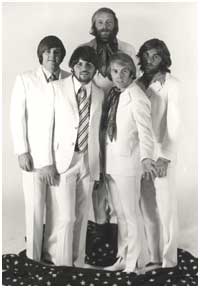
The Beach Boys' biggest hits read like a soundtrack of the 1960s, from their early surf and car songs like "Surfin' USA" and "Little Deuce Coupe" to the fun in the sun smashes like "Fun, Fun, Fun" and "California Girls"... from the psychedelic beauty of "Good Vibrations" to the nostalgic "Do It Again." From 1962-1965, The Beach Boys scored 16 Top 40 hits including "I Get Around" b/w "Don't Worry Baby," one of the greatest singles of all time, and a #1 smash for the group at the very height of Beatlemania.
In 1966, The Beach Boys' one-two punch of the Pet Sounds album and the "Good Vibrations" single, earned the group international acclaim, and established group leader Brian Wilson as the influential genius of modern pop music. As Paul McCartney recently remarked, "Pet Sounds was my inspiration for making Sgt. Pepper's...the big influence. That was the big thing for me (in 1966). I just thought, 'Oh, dear me. This is the album of all-time. What are we going to do?'" At the end of 1966, a year-end poll in one of England's music papers found The Beach Boys topping The Beatles as the #1 vocal group in the world.
In 1967-1969, the last years of their first Capitol association, The Beach Boys had five more Top 40 hits and released a number of albums, such as Brian's personal favorite, Friends, which The Beach Boys fans and critics regard fondly and 20/20 with the Top 20 hit "Do It Again." In 1969, The Beach Boys recorded their final Capitol single, appropriately titled "Breakaway" to indicate that it was the end of the relationship.
The next era for The Beach Boys, which coincidentally began as The Beatles called it quits, is affectionately known as the "Brother Years," in reference to Brother Records, the new family-owned record label and home to The Beach Boys. The new arrangement brought the boys a new level of freedom and control of their music. The broader dimension of the Brother releases showcased the songwriting and production of Dennis, Carl, Al and Bruce in addition to a number of songs penned by Brian and Mike. In the Nineties, the two eras were united when Capitol Records became the licensee of the Brother Records catalog.
The first two Brother releases, 1970's Sunflower and 1971's Surf's Up, are now recognized, by critics and fans, as two overlooked masterpieces. As a group, The Beach Boys were at their prime but rock guitars and feedback eclipsed the brilliant pop music. With 1972's Carl and the Passions - So Tough and 1973's Holland, The Beach Boys wrestled with different music styles. Even with their new sonic adventures, their harmonies, the taproot of The Beach Boys sounds, always shined through.
Around this time, with much thanks to Carl and Mike, The Beach Boys transformed themselves into one of the world's premiere live acts, a title their former labelmates, The Beatles, never could claim. With Carl's musical direction and Mike's role as lead singer and frontman, The Beach Boys took all the
hits and the studio gems and converted them into arena-rock anthems. Seeing The Beach Boys summer concert tour became a truly American experience. A new generation of fans made the music of The Beach Boys their soundtrack to summer. The Beach Boys in Concert, an album that came out in 1973, offers an excellent aural snapshot of this burgeoning entity. On the heels of their touring success, Capitol Records released a 2-record "best of" collection, Endless Summer, in 1974. It went straight to #1 on the album chart and remained on the chart for 3 years. Rolling Stone went on to name The Beach Boys the band of the year in 1974.
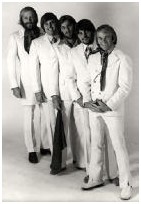
The band took the momentum back into the studio and recorded 15 Big Ones, their first studio record in 3 years. Brian Wilson was back on board and contributed 5 tracks. The band had a chance to pay tribute to their favorite 50s tunes while reinterpreting their signature sound. 15 Big Ones went Top 10 on the album chart. It was followed in 1977 with The Beach Boys Love You.
The late 70's brought the releases M.I.U. (1978), L.A. Album (1979), and Keepin' The Summer Alive (1980). Brothers Carl and Dennis each released their own solo albums. Dennis released his solo album, Pacific Ocean Blue in 1977. Carl released his solo album, Carl Wilson in 1981 and a second record, Youngblood followed in 1984. In 1985 the band released the self-titled album The Beach Boys that featured the Top 20 hit "Getcha Back". Dennis remained a member of The Beach Boys until his drowning death in 1983. Carl Wilson passed away in 1998.
In 1988, The Beach Boys were at the top of the pop charts with the #1 single "Kokomo" from the Cocktail Motion Picture Soundtrack. The multi-platinum "Kokomo" is The Beach Boys biggest selling hit, climbing to #1 on the pop music and video charts of Billboard, Cashbox, Radio & Records and Hits magazines in 1988.
The 1980's and 90's found The Beach Boys performing at milestone events including: the Live Aid Concert, Farm Aid concerts, the Statue of Liberty's 100th Anniversary Salute and the Super Bowl. In 1980, they played to over 500,000 people in the first of four Independence Day concerts on the Washington Monument Grounds. On July 4, 1985 they played to an afternoon crowd of an estimated one million in Philadelphia and that evening they performed for over 750,000 people on the Mall in Washington, D.C. Former U.S. Secretary of Interior James Watt's efforts to ban The Beach Boys from the Washington Monument Grounds in 1983 created an international furor that VH-1 has termed one of the most important moments in rock.
Despite the many quarrels, the Beach Boys kept touring during the early '90s, and Mike Love and Brian Wilson actually began writing songs together in 1995. Instead of a new album though, the Beach Boys returned with Stars and Stripes, Vol. 1, a collection of remade hits with country stars singing lead and the group adding backing vocals. Also, a Brian Wilson documentary titled I Just Wasn't Made for These Times aired on the Disney Channel; an accompanying soundtrack featured spare renditions of Beach Boys classics by Brian himself. Carl's death from cancer in 1998 was a shock to bandmembers, fans and friends. Then, Brian began recognizing his immense influence on the alternative community -- he worked with biggest-fans Sean O'Hagan (of the High Llamas) and Andy Paley on a series of songs that would form his second solo album. Again, good intentions failed to carry through, as the recordings were ditched in favor of another overly produced, mainstream-slanted album named Imagination. By early 1999, no less than three Beach Boys-connected units were touring the country -- a Brian Wilson solo tour, the "official" Beach Boys led by Mike Love, and the "Beach Boys Family" led by Al Jardine.
The recent years have brought a chance for introspection. Fans and critics have now had a chance to re-evaluate the past catalog through reissues and box sets. The world also focused attention on The Beach Boys story. A documentary and DVD release, Endless Harmony, The Beach Boys Story, chronicled the career of the band and was a 2001 Grammy® nominee for "Best Long Form Music Video." The ABC mini-series The Beach Boys: An American Family was nominated for three Emmys® and is one ABC's highest rated mini-series. In 2003, Capitol Records released three Beach Boys projects: The Sounds of Summer - The Very Best of The Beach Boys featuring 30 of the band's greatest hits on one CD; Pet Sounds on the new DVD-Audio technology in 5.1 Surround Sound and 40 Top 40s collecting chart topping singles from around the world.
|
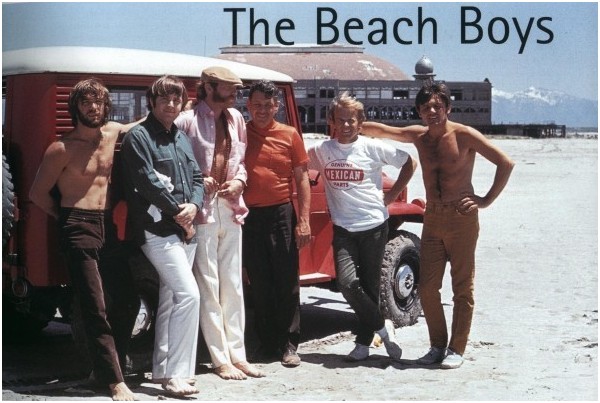


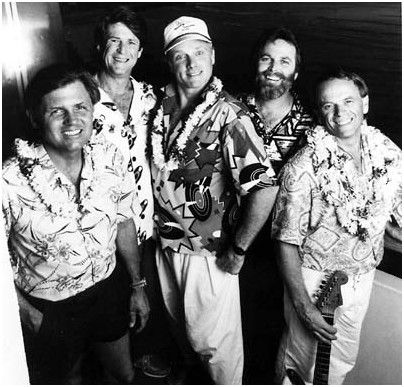
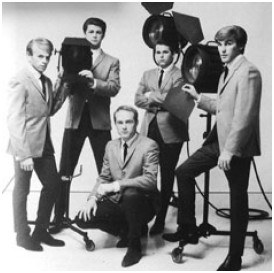
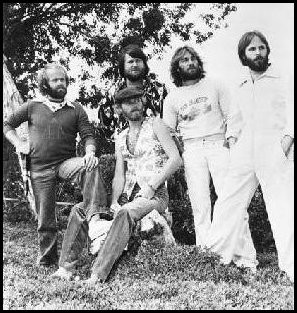
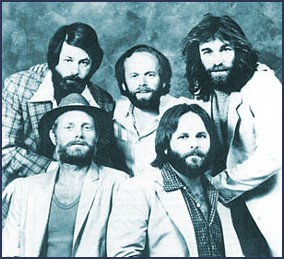

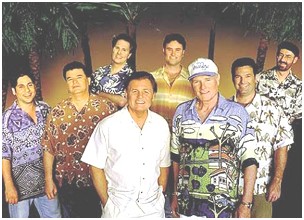

 Beginning their career as the most popular surf band in the nation, the Beach Boys finally emerged by 1966 as America's preeminent pop group, the only act able to challenge (for a brief time) the over-arching success of the Beatles with both mainstream listeners and the critical community. The group's impeccable and amazingly tight harmony unquestionably made them the very best harmony band of the rock era. From their 1961 debut with the regional hit "Surfin," the three Wilson brothers -- Brian, Dennis, and Carl -- plus cousin Mike Love and friend Al Jardine constructed the most intricate, gorgeous harmonies ever heard from a pop band. With Brian's studio proficiency growing by leaps and bounds during the mid-'60s, the Beach Boys also proved to be one of the best-produced groups of the '60s, exemplified by their 1966 peak with the Pet Sounds LP and the number one single, "Good Vibrations." Though Brian's escalating drug use and obsessive desire to trump the Beatles (by recording the perfect LP statement) eventually led to a nervous breakdown after he heard Sgt. Pepper's Lonely Hearts Club Band, the group soldiered on long into the 1970s and '80s, with Brian only an inconsistent participant. The band's post-1966 material is often maligned (if it's recognized at all), but the truth is the Beach Boys continued to make great music well into the '70s. Displayed best on 1970's Sunflower, each member revealed individual talents never fully developed during the mid-'60s -- Carl became a solid, distinctive producer and Brian's replacement as nominal band-leader, Mike continued to provide a visual focus as the frontman for live shows, and Dennis developed his own notable songwriting talents. Though legal wranglings and marginal oldies tours during the '90s often obscured what made the Beach Boys great, the band's unerring ability to surf the waves of commercial success and artistic development during the '60s made them America's first, best rock band.
Beginning their career as the most popular surf band in the nation, the Beach Boys finally emerged by 1966 as America's preeminent pop group, the only act able to challenge (for a brief time) the over-arching success of the Beatles with both mainstream listeners and the critical community. The group's impeccable and amazingly tight harmony unquestionably made them the very best harmony band of the rock era. From their 1961 debut with the regional hit "Surfin," the three Wilson brothers -- Brian, Dennis, and Carl -- plus cousin Mike Love and friend Al Jardine constructed the most intricate, gorgeous harmonies ever heard from a pop band. With Brian's studio proficiency growing by leaps and bounds during the mid-'60s, the Beach Boys also proved to be one of the best-produced groups of the '60s, exemplified by their 1966 peak with the Pet Sounds LP and the number one single, "Good Vibrations." Though Brian's escalating drug use and obsessive desire to trump the Beatles (by recording the perfect LP statement) eventually led to a nervous breakdown after he heard Sgt. Pepper's Lonely Hearts Club Band, the group soldiered on long into the 1970s and '80s, with Brian only an inconsistent participant. The band's post-1966 material is often maligned (if it's recognized at all), but the truth is the Beach Boys continued to make great music well into the '70s. Displayed best on 1970's Sunflower, each member revealed individual talents never fully developed during the mid-'60s -- Carl became a solid, distinctive producer and Brian's replacement as nominal band-leader, Mike continued to provide a visual focus as the frontman for live shows, and Dennis developed his own notable songwriting talents. Though legal wranglings and marginal oldies tours during the '90s often obscured what made the Beach Boys great, the band's unerring ability to surf the waves of commercial success and artistic development during the '60s made them America's first, best rock band.

